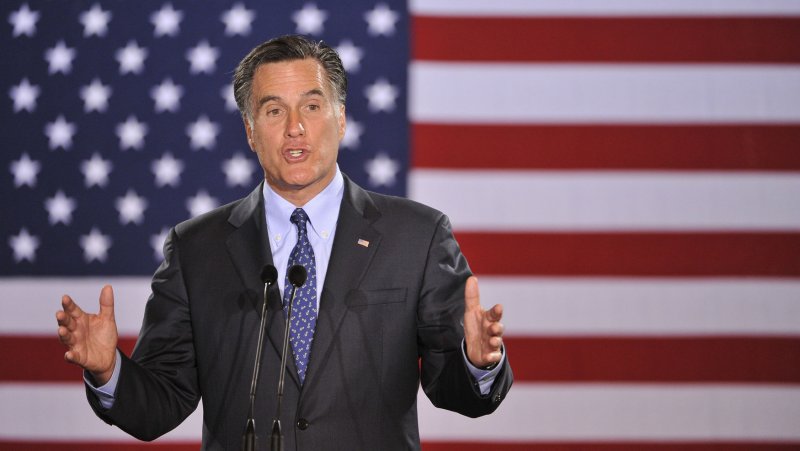Republican Presidential hopeful Mitt Romney speaks to supporters at a rally on April 3, 2012 in Milwaukee, Wisconsin. Wisconsin, along with Maryland and Washington D.C. held their primary elections on Tuesday. UPI/Brian Kersey |
License Photo
WASHINGTON, April 6 (UPI) -- Rick Santorum's delegate count is much closer to front-runner Mitt Romney's than reported, a memo prepared for a conservative campaign huddle in Virginia says.
While most estimates show GOP presidential hopeful Romney with 657 or 658 delegates and Santorum with 273 to 281, "the real count" gives Romney 571 delegates and Santorum 342, the memo by delegate strategist John Yob of the Grand Rapids, Mich., political consulting firm Strategic National said.
Instead of Romney and Santorum being separated by nearly 400 delegates, as widely reported -- which suggests Romney has essentially sewn up the race -- the White House hopefuls are separated by only 229 delegates, said the memo published by CNN and reviewed by United Press International.
"This race is much closer than the media and Establishment Republicans would like to report," the Thursday memo said, as Santorum met with several conservative leaders in Northern Virginia to consider strategies to help his campaign.
Looking ahead, the memo said if the Texas Republican primary May 29, with 155 delegates at stake, switches from a proportional to a winner-take-all election -- and Santorum wins -- "the race is almost even."
The campaign reached its version of the delegate count by making assumptions CNN said many experts don't believe will happen.
These include Florida and Arizona deciding to award delegates proportionally instead of winner take all, the memo said, asserting the states broke Republican National Committee rules by not making their contests proportional.
As a result, "RNC Members and/or the convention will enforce the rules and make the delegations proportional," the memo said. "This will reduce Romney's delegate total substantially and increase the other three candidates' respective delegate totals."
Florida Republican Party spokesman Brian Hughes told CNN his state's rule was accepted by the RNC, so Florida will remain a winner-take-all state. Arizona Republican Party spokesman Shane Wikors told the network his state was making no effort to change its delegate allocation and Texas Republican Party spokesman Chris Elam told CNN the party received no winner-take-all petition signed by a required 15 party members, despite one member's desire to make the change.
Such a change requires a two-thirds vote of a state party meeting as well as RNC and U.S. Justice Department approval.
An RNC spokesman told CNN Texas would remain a proportional state because a change would require a waiver and "there is no basis for a waiver."
The conservative leaders meeting with Santorum Thursday -- including Christian groups, social and fiscal conservatives, and Tea Party movement backers -- discussed the memo's assessment that delegate counts published by the Romney campaign and the media are inaccurate, meeting participant Richard Viguerie, chairman of ConservativeHQ.com, said in a statement.
The attendees also agreed to increase pressure on House Speaker Newt Gingrich of Georgia to quit.
"The conservative leaders are going to ratchet up calls for Newt Gingrich, who has slipped to fourth place, to coalesce behind Rick," Santorum spokesman Hogan Gidley told The New York Times.
Gingrich advisers said had no intention of dropping out.
"It's a no-impact meeting," one adviser told the newspaper. "It's a joke."
The Santorum campaign said it was concerned Gingrich could siphon off just enough votes to cost Santorum the primary election in his home state of Pennsylvania April 24, the Times said.
Santorum -- who lost in the state in 2006 by more than 17 percentage points when he sought re-election to a third term in the Senate -- has said he must win the Pennsylvania primary and has predicted he will.















